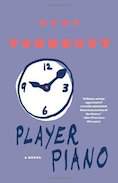
RATING: 8/10…READ: September 4, 2013
A dystopian novel where the ruling class is engineers and society is automated by machines. A great book to examine the extent of which technology makes life easier (automation) but also less human.
Notes:
Anita had the mechanics of marriage down pat, even to the subtlest conventions. If her approach was disturbingly rational, systematic, she was thorough enough to turn out a creditable counterfeit of warmth. Paul could only suspect that her feelings were shallow—and perhaps that suspicion was part of what he was beginning to think of as his sickness.
Hell, everybody used to have some personal skill or willingness to work or something he could trade for what he wanted. Now that the machines have taken over, it’s quite somebody who has anything to offer. All most people can do is hope to be given something.”
Paul reflected that Baer was possibly the most just, reasonable, and candid person he’d ever known—remarkably machine-like in that the only problems he interested himself in were those brought to him, and in that he went to work on all problems with equal energy and interest, insensitive to quality and scale.
There’s something about war that brings out greatness. I hate to say that, but it’s true. Of course, maybe that’s because you can get great so quick in a war. Just one damn fool thing for a couple of seconds, and you’re great. I could be the greatest barber in the world, and maybe I am, but I’d have to prove it with a lifetime of great haircutting, and then nobody’d notice.
The truth can never be spoken without someone getting hurt.
“Nobody’s so damn well educated that you can’t learn ninety per cent of what he knows in six weeks. The other ten per cent is decoration.” “Yes, sir.” “Show me a specialist, and I’ll show you a man who’s so scared he’s dug a hole for himself to hide in.” “Yes, sir.” “Almost nobody’s competent, Paul. It’s enough to make you cry to see how bad most people are at their jobs. If you can do a half-assed job of anything, you’re a one-eyed man in the kingdom of the blind.”
“You want a piece of advice from a tired old man?” “Depends on which tired old man. You?” “Me. Don’t put one foot in your job and the other in your dreams, Ed. Go ahead and quit, or resign yourself to this life. It’s just too much of a temptation for fate to split you right up the middle before you’ve made up your mind which way to go.”
“Public relations,” said Halyard. “Please, what are public relations?” said Khashdrahr. “That profession,” said Halyard, quoting by memory from the Manual, “that profession specializing in the cultivation, by applied psychology in mass communication media, of favorable public opinion with regard to controversial issues and institutions, without being offensive to anyone of importance, and with the continued stability of the economy and society its primary goal.”
“These club members, they get just any book, any picture?” asked Khashdrahr. “I should say not! A lot of research goes into what’s run off, believe me. Surveys of public reading tastes, readability and appeal tests on books being considered. Heavens, running off an unpopular book would put a club out of business like that!” He snapped his fingers ominously. “The way they keep culture so cheap is by knowing in advance what and how much of it people want. They get it right, right down to the color of the jacket.
“I don’t follow. Isn’t his brother happy?” “Utterly and always happy. And my husband says somebody’s just got to be maladjusted; that somebody’s got to be uncomfortable enough to wonder where people are, where they’re going, and why they’re going there. That was the trouble with his book. It raised those questions, and was rejected. So he was ordered into public-relations duty.”
Replacement is not necessarily bad, but to do it without regard for the wishes of men is lawlessness. “Without regard for the changes in human life patterns that may result, new machines, new forms of organization, new ways of increasing efficiency, are constantly being introduced. To do this without regard for the effects on life patterns is lawlessness.
“I hold, and the members of the Ghost Shirt Society hold: “That there must be virtue in imperfection, for Man is imperfect, and Man is a creation of God. “That there must be virtue in frailty, for Man is frail, and Man is a creation of God. “That there must be virtue in inefficiency, for Man is inefficient, and Man is a creation of God. “That there must be virtue in brilliance followed by stupidity, for Man is alternately brilliant and stupid, and Man is a creation of God.
“Most fascinating game there is, keeping things from staying the way they are.”
